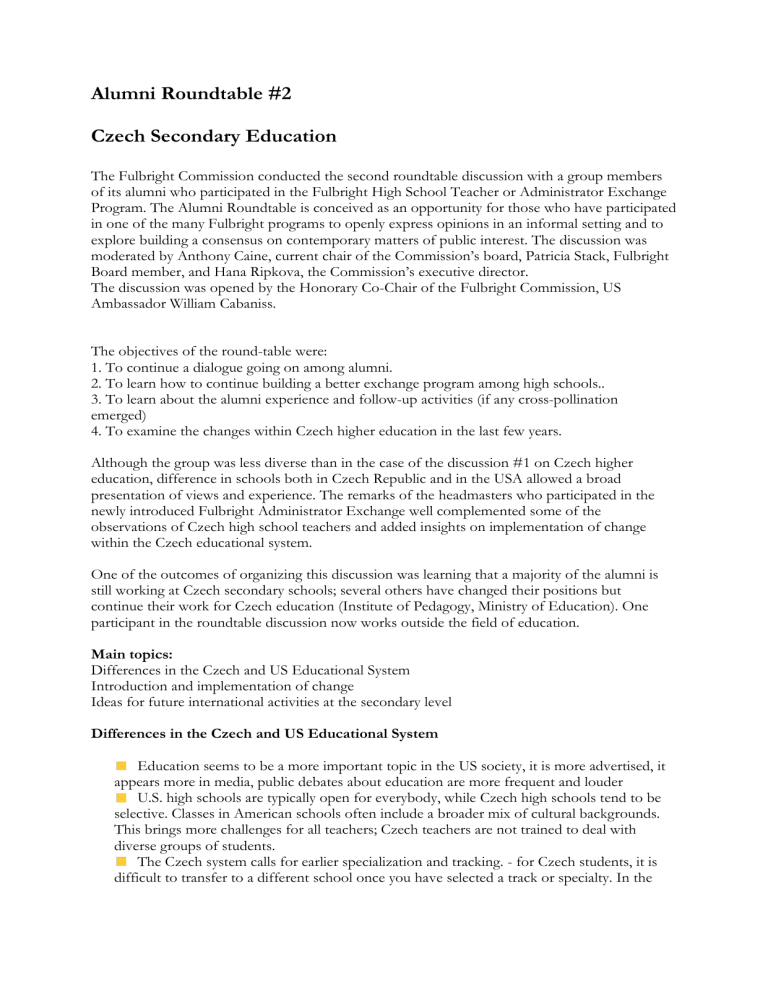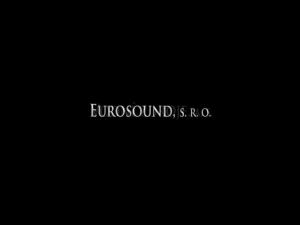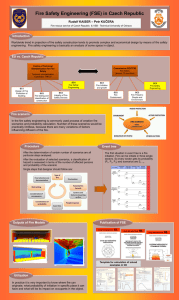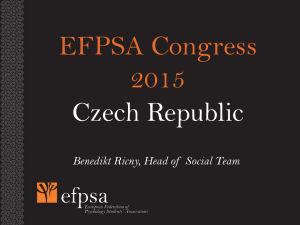Alumni Roundtable #2

Alumni Roundtable #2
Czech Secondary Education
The Fulbright Commission conducted the second roundtable discussion with a group members of its alumni who participated in the Fulbright High School Teacher or Administrator Exchange
Program. The Alumni Roundtable is conceived as an opportunity for those who have participated in one of the many Fulbright programs to openly express opinions in an informal setting and to explore building a consensus on contemporary matters of public interest. The discussion was moderated by Anthony Caine, current chair of the Commission’s board, Patricia Stack, Fulbright
Board member, and Hana Ripkova, the Commission’s executive director.
The discussion was opened by the Honorary Co-Chair of the Fulbright Commission, US
Ambassador William Cabaniss.
The objectives of the round-table were:
1. To continue a dialogue going on among alumni.
2. To learn how to continue building a better exchange program among high schools..
3. To learn about the alumni experience and follow-up activities (if any cross-pollination emerged)
4. To examine the changes within Czech higher education in the last few years.
Although the group was less diverse than in the case of the discussion #1 on Czech higher education, difference in schools both in Czech Republic and in the USA allowed a broad presentation of views and experience. The remarks of the headmasters who participated in the newly introduced Fulbright Administrator Exchange well complemented some of the observations of Czech high school teachers and added insights on implementation of change within the Czech educational system.
One of the outcomes of organizing this discussion was learning that a majority of the alumni is still working at Czech secondary schools; several others have changed their positions but continue their work for Czech education (Institute of Pedagogy, Ministry of Education). One participant in the roundtable discussion now works outside the field of education.
Main topics:
Differences in the Czech and US Educational System
Introduction and implementation of change
Ideas for future international activities at the secondary level
Differences in the Czech and US Educational System
Education seems to be a more important topic in the US society, it is more advertised, it appears more in media, public debates about education are more frequent and louder
U.S. high schools are typically open for everybody, while Czech high schools tend to be selective. Classes in American schools often include a broader mix of cultural backgrounds.
This brings more challenges for all teachers; Czech teachers are not trained to deal with diverse groups of students.
The Czech system calls for earlier specialization and tracking. - for Czech students, it is difficult to transfer to a different school once you have selected a track or specialty. In the
U.S., students can easily change subjects within a school. (Larger US schools usually offer a wide variety of electives and programs for students to choose from.)
In the Czech Republic, the first children tracking is done already very early – particularly in the case of language and other special schools. The selection of school types increases as the student’s age increases.
A majority of the Czech Fulbright teachers experienced larger classes in the US than they are accustomed to; the presence of smaller classes in Czech schools especially for learning languages is a clear positive of the Czech system.
There are considerable differences among the views of people from larger cities versus smaller towns; the choice available for students in Prague, Brno or Olomouc is significantly greater than in smaller towns. This difference creates problems when trying to implement a new system of electives. In small schools, one cannot fully take advantage of new education policies, as the possibility of introducing new subjects within smaller classes is limited.
Work of teachers is different in Czech schools than it is in the US. The lack of support staff in Czech schools places considerably more administrative tasks and other roles on the teaching staff (educational advising, psychological help, career advising), without offering needed training in these fields. The US school system includes a network of quality support staff; this is seen as an important advantage.
In consensus, the alumni would welcome:
Better training of teachers for a more diverse classroom
Increasing the role of the support staff in schools, particularly guidance counseling and dealing with students requiring special attention, etc.
Keeping lower numbers of students in a class
Notable quotes:
“It is challenging to have e.g. mentally handicapped children in classrooms.”
“In the U.S. there are counselors who deal with individuals who have mixed background, behavioral problems, need guidance- we would welcome this kind of support.”
“More improvement at the level of teacher training is extremely important, if we are heading towards more diverse groups in the classrooms, we have to be prepared to effectively work with them.”
Introduction and Implementation of Change
A consensus of the group noted that changes within the Czech system are now being introduced, although the opinion concerning who should be the driving force to implement these changes varied.
The Ministry of Education has enacted new legislation that leaves more space for individual teachers or school committees to formulate their own curricula. It also clearly encourages broader comprehensive education rather than early specialization or vocational training.
Elementary schools have been directed to introduce new curricula in 2007 They must prepare new programs; only the educational framework is provided by the MSMT. Secondary schools are expected to introduce their new curricula in 2009. (This new model is now being tested in 16 secondary schools.)
The new framework found its defenders and opponents:
The framework concept is very nice but difficult to realize. No matter what degree of creativity is included in the new curricula, students nevertheless at the ages of 11, 14 or 18 will take exams for selective schools and must be prepared for them
Everything should be viewed from the point of view of a student. MŠMT published a framework, every teacher is expected to complete it in detail for his/her students.
It is always difficult to achieve the right balance between delivering content and engaging students at the same time; some of the roundtable’s participants have never felt limited.
In this respect, they try to implement the best possible mix.
Some schools are already waiting for the framework, they have plans for change, others feel that their situation (economic, personnel) does not allow them to achieve the framework’s goals
Notable quotes:
“It is wonderful to observe that we have space for our own ideas.”
“We cannot divide classes to comply with a new model. I have 28 students, I cannot divide them, I am only ONE.”
“A good teacher can always find ways of engaging the students through delivering of the topic, it just often means more work in preparation of the lessons but it is worth it.”
“The atmosphere in some schools has changed a lot, we have young and dedicated colleagues.”
The role of regions and decentralization
Fear of broadening the gap between schools in different parts of the Czech Republic:
Regions with high unemployment and lower wages could find that there is less investment into education. (This situation has been widely observed by some teachers and administrators in the United States, and they would like to prevent this in the Czech
Republic.)
Financing of education should be still defined by the central government
Education in the countryside should be the same as in towns. Resources exist, it is necessary to deploy them in the right way.
Notable quotes:
“It would be worse if a higher portion of money is earmarked locally, in regions with higher unemployment education will suffer (i.e., allocations from local taxes are low).”
“Having a system in which you can always expect some standard level is a plus”
The role of headmasters
Headmasters are arguably one of the weaker points in the Czech educational system
Headmaster’s accountability is not well defined or controlled.
No rotational system for headmasters exists. Headmasters usually stay in their positions for many years, although their performance may not be sufficient.
If the headmasters were in position for a shorter, defined period of time (example from
Spain- 4 years) , some administrators fear that they would not have sufficient time to learn their trade and become effective, as the number of rules, procedures, and legislation they have to learn and follow is enormous. Others would welcome the Spanish program for headmaster tenure as a means to achieve better accountability.
The school boards could become a partner to the management of schools but they are a new element within the system and there is no experience with their function so far.
Notable quotes:
“The role of the principal has changed in the last years but some headmasters in the position are not willing to respond to the need for change.”
Ideas for future international activities at the secondary level
The roundtable’s participants encourage the Fulbright Commission to help find suitable projects between Czech schools and U.S partner schools.
Teleconferences would be a welcome activity for schools, but they are very expensive; an e-mail conference would be more feasible.
As it is often difficult to maintain activities with US schools due to the amount of work
US teachers have, the Fulbright Commission could act as a facilitator for such projects..
If possible, the Commission might establish shorter exchange programs, e.g. 4 months, thus more teachers could participate. This might be an option, but some participants objected, noting that the effectiveness of their teaching was much higher towards the end of the grant period. Shorter exchange periods could reduce efficiency.
Three years of teaching experience is today prerequisite to be eligible for the program.
This may be an obstacle for some applicants, but new teachers have other programs that they are able to take advantage of and participate in (e.g., Comenius).
Exchanges of secondary school students are possible but proved to be more effective for a shorter period and consisting of a group of students led by a teacher; summer programs for students are a very good option for learning more about the other country and motivation for language learning.
The quality of schools in the US is varied; exchange programs for students should take that into account and select appropriate partner schools.
Although the teachers would welcome more joint activities with their American counterparts, they can see the limitation in the workloads on both sides. As observed, the willingness to continue cooperation after the Fulbright exchange depends often on the quality of individual experience of the grantees, the support their school provides. The Fulbright Commission should try to identify ways of nurturing follow-up projects to maintain a long term effect on students.
Notable quotes:
“It depends on teachers on the other side, U.S. teachers are very busy. It would be easier if they had a chance to visit.”
“If individual secondary school students are sent, they feel isolated after coming back.”
“Encourage a partner school to engage more (it is a lot of work, but we have to focus on the outcome).”








